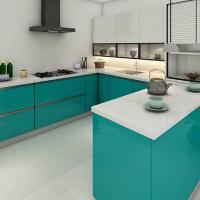Modern Ideas for Modular Kitchen Design to Maximize Space and Functionality

The kitchen has always been considered the heart of a home, but in today’s fast-paced world, it is no longer just a place for cooking. It has evolved into a multifunctional space where meals are prepared, families gather, and even work or study can take place. A modular kitchen design offers the perfect solution to blend efficiency, aesthetics, and convenience, making the most of the available space while providing a functional layout.
Understanding Modular Kitchen Design
A modular kitchen design refers to a kitchen setup created using pre-fabricated units or modules that can be arranged and customized according to the needs of the user. Unlike traditional kitchens, which are often fixed and inflexible, modular kitchens are adaptable. Each module serves a specific purpose, whether it is storage, cooking, or cleaning, allowing homeowners to optimize every inch of space.
The advantage of this approach is the combination of flexibility and organization. Modular units are designed to fit perfectly, reducing clutter and improving workflow. This ensures that every tool, utensil, and appliance has its place, resulting in a kitchen that is not only functional but also visually appealing.
Maximizing Storage Space
One of the biggest challenges in kitchen design is storage. Limited cabinets and drawers can make a kitchen feel cramped and disorganized. A modern modular kitchen design addresses this problem by incorporating innovative storage solutions. Tall cabinets that extend up to the ceiling, pull-out drawers, corner units, and overhead racks help utilize vertical space effectively.
By integrating modular storage options, homeowners can store utensils, cookware, and groceries in a more organized manner. Special compartments for spices, cutlery, and other essentials make accessing items convenient, reducing the time spent searching for ingredients or tools while cooking.
Functional Layouts for Efficiency
A kitchen’s layout plays a crucial role in ensuring smooth workflow. The concept of the work triangle, which connects the stove, sink, and refrigerator, is central to functional kitchen design. Modern modular kitchen design embraces this principle by arranging modules in layouts that enhance efficiency. Popular layouts such as L-shaped, U-shaped, and parallel kitchens can be customized using modular units to suit the available space and the cooking habits of the household.
By positioning appliances and work areas thoughtfully, modular kitchens reduce unnecessary movement and make daily cooking tasks more convenient. This careful planning ensures that the kitchen remains clutter-free while providing ample counter space for meal preparation.
Incorporating Multifunctional Elements
Space optimization in modern kitchens is not just about storage; it is also about multifunctionality. Modular units often combine several functions within a single module, making the kitchen more versatile. For example, a kitchen island can serve as a countertop, storage space, and even a breakfast area. Pull-out cutting boards, foldable countertops, and integrated appliances help in maximizing utility without consuming extra space.
Multifunctional elements in a modular kitchen design also contribute to a cleaner and more organized environment. Hidden compartments and built-in appliances reduce visual clutter, giving the kitchen a streamlined and modern appearance while maintaining practical functionality.
Choosing the Right Materials
Materials play a vital role in both the aesthetics and durability of a modular kitchen. Modern ideas for modular kitchen design focus on using materials that are easy to maintain, resistant to wear and tear, and visually appealing. Laminates, stainless steel, engineered wood, and tempered glass are popular choices that offer durability and elegance. The choice of materials also influences the color scheme and overall style of the kitchen, allowing homeowners to create a cohesive and modern look.
Countertops, cabinet finishes, and flooring should complement each other while being practical for everyday use. Materials that resist stains, heat, and moisture ensure that the kitchen remains functional and attractive for years to come.
Enhancing Lighting and Ambiance
Lighting is another crucial aspect of a modern modular kitchen design. Proper lighting improves visibility, enhances the mood, and highlights design elements. A combination of task lighting, ambient lighting, and accent lighting ensures that every area of the kitchen is well-illuminated. Under-cabinet lighting, pendant lights over islands, and recessed ceiling lights can be strategically placed to create a bright and welcoming environment.
In addition to functionality, lighting can also accentuate the beauty of modular kitchen units and highlight materials and finishes. Well-planned lighting ensures that the kitchen is not only efficient but also inviting and stylish.
Personalization and Aesthetic Appeal
Modern kitchen design is not just about functionality; it is also an expression of personal style. A modular kitchen design allows homeowners to personalize their space through colors, finishes, and layouts. From minimalistic designs with clean lines to bold and vibrant kitchens with contrasting colors, modular units can be customized to reflect individual tastes.
Adding decorative elements such as backsplash tiles, glass cabinet doors, and stylish handles can further enhance the aesthetic appeal. A well-designed modular kitchen balances practicality with elegance, creating a space that is both beautiful and efficient.
Conclusion
A modern modular kitchen design is more than just a trend; it is a practical solution for contemporary living. By combining efficient storage, functional layouts, multifunctional elements, durable materials, proper lighting, and personalized aesthetics, modular kitchens maximize space and enhance usability. They transform ordinary kitchens into organized, stylish, and highly functional spaces that cater to the dynamic needs of modern households. Investing in a modular kitchen design not only improves the daily cooking experience but also adds value to the home, making it a smart choice for anyone looking to create a modern, functional, and elegant kitchen.







